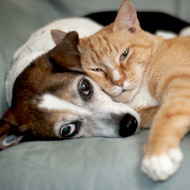
Tests show H3N2 strain can replicate and spread amongst felines
A strain of canine influenza, which affected a large number of dogs in midwest America throughout last year, has been confirmed in cats in the Wisconsin region.
Seven cats at an animal shelter in Northwest Indiana have tested positive for the H3N2 canine influenza virus, which was not seen in the US until March 2015.
“Suspicions of an outbreak in the cats were initially raised when a group of them displayed unusual signs of respiratory disease,” said Dr. Sandra Newbury, director of the Shelter Medicine Programme at the University of Wisconsin School of Veterinary Medicine.
“While this first confirmed report of multiple cats testing positive for canine influenza in the US shows the virus can affect any cats, we hope that infections and illness in felines will continue to be quite rare.”
Feline cases previously reported in South Korea suggest that the virus was capable of making the jump from dogs and cats.
Yet when a single cat fell ill with the virus in America last year, no repeated sampling was carried out. This was because the sample was not believed to be positive until some time after the cats symptoms had resolved.
But now, as tests by the University of Wisconsin Shelter Medicine show, the virus can indeed replicate and spread from cat to cat.
“Sequential sampling of these individual cats have shown repeated positives and an increase in viral loads over time,” said Kathy Toohey-Kurth, virology section head at the Wisconsin Veterinary Diagnostic Laboratory.
Preliminary research of the virus shows that the virus is identical to the H3N2 strain that infects dogs. A full genetic analysis and study of the infection is now underway.
The researchers are also working closely with the animal shelter to curtail the outbreak. A number of dogs have already tested positive for the virus.
“At this time, all of the infected cats have been quarantined, and no infected cats have left this shelter," said Dr. Newbury. “We will continue to watch carefully for instances of the disease.”
Clinical signs of canine influenza in cats are respiratory symptoms like congestion, runny nose and general malaise. Some of the cats at the shelter were noted to be hyper-salivating and “lip smacking” as well.
The researchers say that no cats have died from the occurrence of the disease and are recovering ‘relatively uneventfully with supportive care’.
Although an H3N2 vaccine exists for dogs, there is currently no vaccine approved or recommended for cats.



 The Veterinary Medicines Directorate (VMD) is inviting applications from veterinary students to attend a one-week extramural studies (EMS) placement in July 2026.
The Veterinary Medicines Directorate (VMD) is inviting applications from veterinary students to attend a one-week extramural studies (EMS) placement in July 2026.